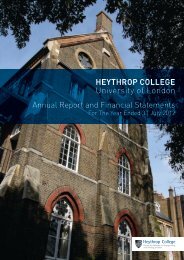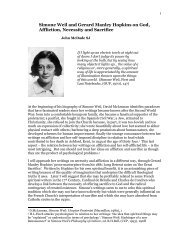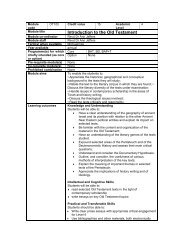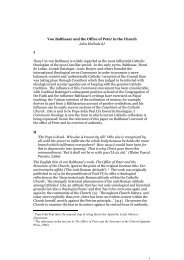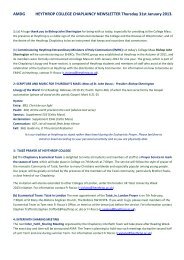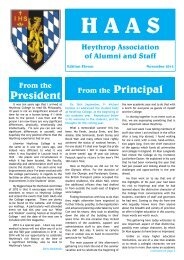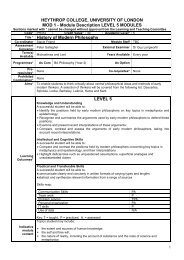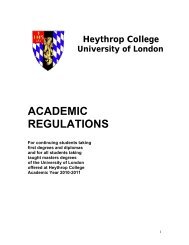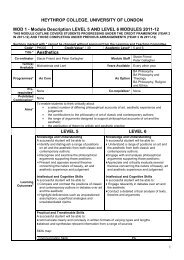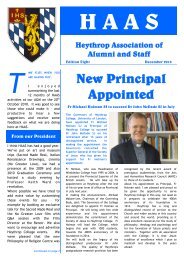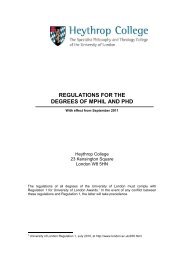Wallace_Stevens.pdf - Heythrop College
Wallace_Stevens.pdf - Heythrop College
Wallace_Stevens.pdf - Heythrop College
Create successful ePaper yourself
Turn your PDF publications into a flip-book with our unique Google optimized e-Paper software.
18<br />
even if it has to do so in a fiction,’ he writes. 54 This phrase ends his commentary on the<br />
section ‘It Must Give Pleasure: III’ of ‘Notes Toward a Supreme Fiction’ that begins, ‘A<br />
lasting visage in a lasting bush’.<br />
The status of our image-making, or our singing, is that it enhances us, its creator and singer,<br />
increasing and heightening our grasp of our own reality, through our fictive imagining of the<br />
outside world. If you find this problematic and fear a collapse into a Kantian assertion of<br />
‘noumena’ to which we do not have access, you are probably a post-Kantian, but certainly pre-<br />
Nietzschean, ontologist who holds that all truth about the world is grounded in an absolute truth,<br />
God himself, the guarantee of all instances of veracity. Nietzsche, in frustration, exclaimed: ‘I fear<br />
we are not getting rid of God because we still believe in grammar’. 55 This powerful remark says<br />
that if we still trust that sentences carry truthful statements, and that there is an underlying<br />
realism in relation to language and truth, then, Nietzsche judges despairingly, this is intrinsically<br />
theistic. That there is an objective order that can be interpreted linguistically and semantically is<br />
the theological/realist context against which Nietzsche’s atheism rages. As long as we make<br />
coherent, truth-bearing sentences, we are still caught in the God-governed order of things, words<br />
and truth. (Damn! How can I be an atheist when my language won’t let me) Alastair<br />
MacIntyre’s comments on Nietzsche here has a bearing upon the status of <strong>Stevens</strong>’ discussion of<br />
the supreme fiction. He says that<br />
What is preserved in this kind of residual ‘non-theistic theism’ [which Nietzsche attacks]<br />
is the assumption that there is a single true view of the world and of its ordering, and for<br />
human judgments to be true and for human desiring and willing to be aimed at what is<br />
genuinely good they must be in conformity with that divinely created order. … [The<br />
accusation of Nietzsche] is that the conception of rationality, indeed the conception of<br />
language and its mode of application to the world presupposed by that conception, is<br />
itself theological…. So [Nietzsche’s] accusation is not just that theism is in part false<br />
because it requires the truth of realism, but that realism is inherently theistic.<br />
What Nietzsche means by belief in grammar was belief that the structure of language<br />
somehow mirrors and presupposes belief in an order of things, in virtue of which one<br />
mode of conceptualizing reality can be more adequate to that reality than another. To rid<br />
oneself of such a belief would be instead to treat purely linguistic meanings as a set of<br />
context-free structures, available for expressing and indefinitely large number of<br />
alternative conceptualizations, none more adequate than any other, because there is no<br />
underlying reality in relation to which adequacy could be measured. It was Nietzsche’s<br />
insight that so long as reference to such a reality is still presupposed, belief in God is<br />
covertly present. And in so asserting Nietzsche simply inverted the Augustinian<br />
standpoint: without God there is no genuine objectivity of interpretation or<br />
conceptualization. 56<br />
Should we characterise <strong>Stevens</strong>’ approach to imagination and the real as a form of ‘residual “nontheistic<br />
theism”’ attacked by Nietzsche and elucidated by MacIntyre: while explicitly denying that<br />
there is a God, nevertheless there is a working (‘residual’) assumption that the role of the poet is<br />
to interpret, imaginatively, the features of an ordered world – a form of ‘implicit, non-theistic<br />
realism’. Or does <strong>Stevens</strong> belong to the other camp in which we have rid ourselves of the idea of<br />
an ordered world and ‘adequacy’ no longer is identifiable or measurable Align poetry and<br />
religion as <strong>Stevens</strong> explicitly does, linking them only apparently chronologically – religion was for<br />
an earlier age, poetry is for now – declare God to be the ‘supreme fiction’, and you are left facing,<br />
54 L, 438.<br />
55 F.Nietzsche, ‘”Reason”’ in Philosophy’, Twilight of the Idols, in The Anti-Christ, Ecce Homo,<br />
Twilight of the Idols ed,. A.Ridley & J.Norman (CUP, 2004), 170)<br />
56 A.MacIntyre, Three Rival Versions of Moral Inquiry (University of Notre Dame Press, 1990),<br />
67, 98.



